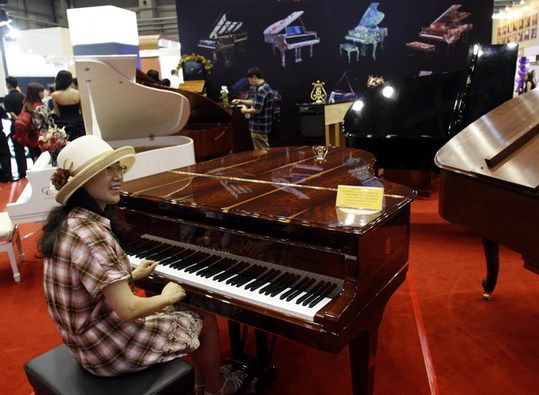
 |
|
A visitor plays the piano. [Photo/China Daily] |
"I have confidence in a bright future for the maintenance of luxury items, although it is not the main business of my company," Li said.
Part of Secoo's maintenance service is devoted to the customers of its secondhand luxury shop - and it is free.
"The maintenance market has much potential," said Li, who plans to make back the investment in his factory in three years.
In the past, the Chinese bought few luxury goods and maintenance was not a problem. The situation is now changing as increasing numbers of Chinese people buy high-end goods and require maintenance service.
China will be the largest consumer of luxury goods by 2015, according to a report on global luxury markets by the Boston Consulting Group on June 5. The report also shows that the luxury brand-obsessed Chinese account for sales that are surging 22 percent annually.
Even some smaller stores that once concentrated on polishing shoes have now opened their businesses to the maintenance of luxury items.
A woman surnamed Wang operates one of a chain of shoe-polishing shops with her brother near Beijing's Fourth Ring Road. She also takes in luxury bags that require cleaning.
Because her shop is too small to carry out all the work herself, she usually sends the bags to the chain's headquarters, Wang said.
"After all, it is a new business opportunity for us and maybe we can work on the luxury bags by ourselves in the future," she said.
However, the ambitious entrepreneurs in this new market still have to deal with some challenges - and technology is one of them.
It is widely known that some luxury maintenance stores have damaged customers' goods, which more often than not are hand-made and need to be dealt with very carefully.
A man surnamed Cai complained to a website set up to protect consumers' rights that he took a white LV belt to a store near Beijing Workers' Stadium in February and it was dyed during the cleaning process. The inside of the belt was damaged while it was being ironed and cannot be used anymore, he said.
Cai said the shopkeeper refused a refund.
"We also get some luxury products that have been broken by other stores and sent to us for repair," Wang Ruilin said.
The technicians working on luxury maintenance should have a large amount of experience rather than just speculative knowledge, business insiders said. But some technicians just complete one to two months of training and then start work in maintenance stores.
"Such technicians cannot deal with complicated problems and luxury products are numerous in their variety," Wang said.
Industry analysts are calling for a set of standards to regulate the stores.
The lack of related technology regulation and unified workflow in the industry make the standards of different stores uneven, said Ren Guoqiang, a partner with Roland Berger Strategy Consultants, a consulting firm in Germany.
"Secoo is working on creating a set of standards for the sector to avoid poor service tarring the industry," Li said.
Analysts also warned entrepreneurs not to move too fast in the luxury maintenance market as competition gets tougher in big cities such as Beijing and Shanghai.
There are about 30 luxury maintenance stores in Hangzhou, Zhejiang province. Fierce competition may trigger price battles, business insiders said.
"Some stores in Hangzhou started to cut their prices to about 40 yuan for cleaning a bag, far below the cost," said Wang Ruilin, "It is impossible for them to make a decent profit."
Rapid saturation will ruin the luxury maintenance market just as it gets going, said Ren.
"The luxury maintenance industry, like other luxury related industries, still has a long way to go," said Ren. "But we are optimistic about the future."


 Washington to remain focused on Asia-Pacific
Washington to remain focused on Asia-Pacific RQFII target blue chips amid bear market
RQFII target blue chips amid bear market Australian recall for top two exporters
Australian recall for top two exporters China fears new car restrictions
China fears new car restrictions